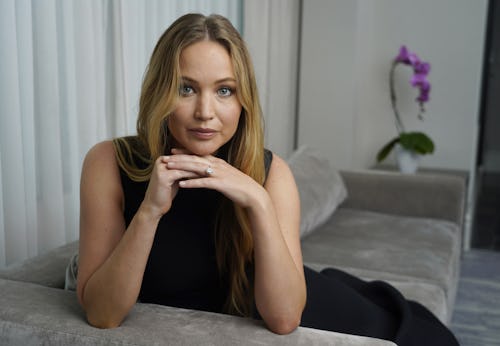
Jennifer Lawrence has never been one to shy away from sharing her truth. Most recently, the Oscar winner spoke openly about her decision to take a step back from the spotlight and got real about the pressure she felt to lose weight for The Hunger Games; now, Lawrence is lifting the curtain on the toxic masculinity she’s experienced first-hand.
During The Hollywood Reporter’s recent Actress Roundtable — which also included Michelle Williams, Michelle Yeoh, Danielle Deadwyler, Emma Corrin, and Claire Foy — the Don’t Look Up star shared that working with female filmmakers has changed her perspective on how a set should be run. Lawrence, who collaborated with director Lila Neugebauer on Causeway, specifically addressed the stark differences between working with women versus men.
“It was just so interesting to be on a female-led movie. My producing partner and I were the lead producers. We had a female director. The schedule made sense. There were no huge fights,” she said. “If an actor had a personal thing and wanted to leave early, instead of going, ‘Oh! Well, we’d all love to leave early!’ we’d put our heads together and go, ‘Okay. How can we figure this out?’ We disagreed, and we listened to each other. Sometimes I was wrong and would learn that I was wrong, and sometimes I was right.”
Lawrence went on to call out the hypocrisy women who lead film projects are subjected to; they’re essentially reduced to being too “emotional.” It’s an inaccurate stereotype, Lawrence noted, citing X-Men director Bryan Singer — who has been called out by actors and accused of sexual misconduct on set — as a more fitting example. “It was incredible to not be around toxic masculinity,” Lawrence said of working on Causeway. “And it did always just make us laugh about how we ended up with, ‘Women shouldn’t be in roles like this because we’re so emotional.’ I mean, I’ve worked with Bryan Singer. I’ve seen emotional men. I’ve seen the biggest hissy fits thrown on set.”
Lawrence continued, “[Neugebauer’s] my third female director, and they are the calmest, best decision-makers I’ve ever worked with. I absolutely love working with female directors.”
Things are looking up for women directors. In 2020, The New York Times reported that 10% of 2019’s highest grossing films were directed by women, according to an analysis by USC Annenberg’s Inclusion Initiative. While that number may be small, it’s more than double that of the prior year. Here’s hoping we see more women in the director’s chair in the coming years. Their casts and crews, as well as the audience, will most definitely benefit from this long-awaited change.







